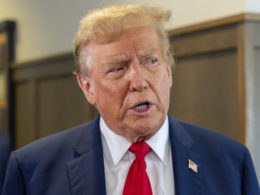In a long on-camera conversation on the MDMEETS – Essential Talks with Mathias Döpfner show, Hungarian Prime Minister Viktor Orbán laid out a “peace” vision for Russia’s war against Ukraine that would freeze Russian gains, slash Western support for Kyiv, and sideline the EU from any settlement. Speaking about his meeting with Donald Trump, Orbán insisted the former US president is the only leader who can end the war and portrayed himself as a lone mediator between Moscow and the West.
Orbán’s comments on Essential Talks show how a sitting EU and NATO leader is amplifying Kremlin-friendly narratives from inside the bloc, undermining support for Ukraine while demanding that Brussels remake itself around his agenda. For Ukraine’s partners, this is not just Hungarian domestic politics — it is a strategic vulnerability inside Europe’s own camp.
Trump as “man of peace,” Ukraine as expendable bargaining chip
Asked directly about Ukraine, Orbán gushes over Trump. In his words, "Donald Trump is the man of peace."
He claims that if Trump had been in office when Russia launched its full-scale invasion, “the war is over” within a day, or it would never have started at all. In Orbán’s telling, Trump’s pro-business instincts make war irrational, so peace is simply a matter of letting a few “real leaders” cut a deal between Moscow and Washington.
Ukraine barely appears in this story as a sovereign actor. Instead, Orbán suggests:
- the West should stop “escalating” and avoid showing military strength on the battlefield,
- negotiations should be led by Trump and other “big guys,” with Kyiv reduced to an object of talks,
- Russia’s nuclear arsenal makes any effort to help Ukraine win too dangerous, so the priority is to “stop” the war quickly, not justly.
This framing mirrors the Kremlin’s long-running line: that only Washington really matters, Ukraine cannot win, and the price of “peace” is accepting Russia’s gains.
Orbán's ”peace for Ukraine” plan that bakes in Russian occupation
When pressed about territory, Orbán refuses to say whether he would accept Russia keeping Crimea and the Donbas — but then immediately predicts that Russia will take more. On Donetsk, he shrugs that, “if miracle will not happen they will” — a reference to Russian forces occupying the region.
From there, his “peace” architecture looks like this:
- freeze the front line and “stabilize the eastern border of Ukraine,”
- negotiate what weapons Russia may keep on that line — and what NATO countries may deploy on the western side,
- create a demilitarized zone,
- then decide who will finance and rebuild Ukraine and whether Russia returns to global energy trade.
It is striking what is missing:
- No demand that Russia withdraw from occupied Ukrainian territory.
- No acknowledgement of Ukrainian security guarantees on their own terms.
- No mention of justice for war crimes or the right of Ukrainians to choose their future.
Instead, Orbán says openly that he doesn’t care whether this outcome is “losing or winning for Putin” as long as it produces a new European “security system” that works for “us” — meaning Europeans like him.
“This war kills European Union”: turning EU aid into the villain
Orbán’s sharpest anger is not directed at Russia, but at Brussels and Kyiv. He argues that continuing to support Ukraine is destroying the EU’s economy and finances:
He complains that the EU has already spent around €185 billion, that the European economy is losing competitiveness, and that “this war kills European Union” — economically and financially.
To justify cutting Ukraine off, he leans on two Kremlin-friendly tropes:
- “Ukraine can’t win.” Orbán flatly states that Europe is “financing a country” with no chance of victory, so further aid is irrational.
- “Ukraine is corrupt.” He cites recent scandals and even repeats his earlier smear that President Volodymyr Zelenskyy is part of a “war corruption mafia,” using this as an argument to stop support rather than to demand reforms.
This is not an abstract philosophical debate. In Brussels, Orbán has already blocked or threatened to block multiple EU aid packages and sanctions rounds, aimed at stopping Russian war, forcing other member states to work around him to keep backing Kyiv.
His interview positions are fully consistent with his behavior at home, where he recently launched a nationwide petition branding EU defense initiatives as “war plans” and urging Hungarians to reject further military aid for Ukraine — directly attacking the tools Kyiv needs to survive.
Outlier in Brussels: portraying the EU as a failing “empire”
Orbán repeatedly describes the EU not as a community he helped build, but as a hostile power trying to “blackmail” and “suffocate” Hungary economically. He even claims that the main reason he needs a financial “shield” from Trump is against Brussels, not Moscow.
In the interview, he:
- calls the current integration model a failure, saying “Europe as it is failed under this integration process,”
- argues that EU “disintegration is going on” and that the Union is effectively dying,
- denounces EU institutions as “occupied” by left-liberal forces pushing an “imperialistic” project that crushes national sovereignty.
On Ukraine, this translates into Orbán standing almost alone in the European Council — abstaining or vetoing where others back sanctions, aid, and accession talks. Other EU leaders have increasingly treated him as an outlier, finding legal and political workarounds to bypass his vetoes and reaffirm support for Ukraine’s sovereignty.
Shared playbook with Trump on Ukraine and Europe
Orbán underlines that his worldview and Trump’s are aligned not just on Ukraine but on Europe more broadly. He praises Trump as an anti-bureaucratic “real leader” and complains that the EU has become a war-mongering bureaucracy.
The overlap looks like this:
- Quick-fix personal diplomacy. Both men promise they can end the war rapidly through personal deals with Putin, with Trump previously boasting he could do it in “24 hours” and Orbán now insisting that only Trump can be “a good instrument to make a peace between the Russians and the Ukrainians.”
- Blaming the West, not Russia. Rather than focusing on Russia’s aggression, they accuse EU support for Ukraine of “prolonging” the war. Orbán says the “American president is in favor of the peace” while “Europeans… would not like to have a peace just now,” caricaturing the EU as addicted to war spending.
- Using Ukraine as leverage. Both have treated Ukraine’s survival as a bargaining chip in wider fights — Trump for sanctions and alliance politics, Orbán for energy and budget concessions inside the EU.
For Ukrainians and their supporters, this is a dangerous combination: a US president promising simplistic deals, and an EU premier eager to help sell them, even at the cost of Ukrainian territory and European credibility.
Why it matters for Ukraine and its allies
Orbán’s interview is not just another contrarian hot take. It shows how far a Kremlin-friendly framing of “peace” has penetrated into EU and NATO decision-making:
- Normalizing Russian gains. Orbán's ”peace for Ukraine” treats Russian occupation as inevitable and Ukrainian victory as impossible, helping shift the Overton window toward rewarding aggression.
- Undermining Western unity. Every time he calls EU support for Kyiv “irrational” or claims the war is “killing” Europe, he hands Moscow another talking point to exploit in European capitals already wrestling with war fatigue.
- Marginalizing Ukraine’s voice. A Trump-Orbán “deal” model sidelines Ukrainians from deciding their own future, turning them into objects of diplomacy between Washington, Moscow, and a handful of “big guys.”
Orbán’s long-standing political friendship with Putin makes it difficult to see him as a neutral mediator; instead, he appears as an outlier inside the EU whose positions routinely tilt toward Kremlin interests and away from Ukraine’s democratic choice to integrate with Europe. The rest of the EU — and Ukraine’s transatlantic allies — will have to keep building mechanisms that support Kyiv despite Budapest, not through it.





